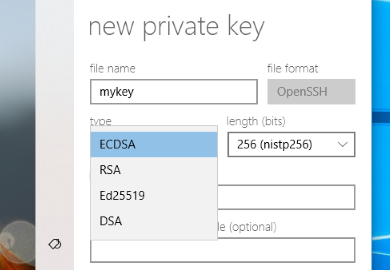Ubuntu Terminal Generate Ssh Key
Posted : admin On 24.05.2020- Ubuntu Ssh Keys Location
- Ubuntu Terminal Generate Ssh Key Github
- Generate Ssh Public Key
- Ssh Generate Key

SSH, the secure shell, is often used to access remote Linux systems. But its authentication mechanism, where a private local key is paired with a public remote key, is used to secure all kinds of online services, from GitHub and Launchpad to Linux running on Microsoft’s Azure cloud.
On terminal cat /.ssh/idrsa.pub. Cat is a standard Unix utility that reads files and prints output Is your Home User path /.ssh - your hidden directory contains all your ssh certificates; idrsa.pub OR iddsa.pub are RSA public keys, (the private key located on the client machine). The primary key for example can be used to enable cloning project from remote repository. In this particular instance ssh-import-id retrieves an SSH key from GitHub for you. The tool can import from both GitHub and Launchpad. The tool can import from both GitHub and Launchpad. Normally the tool takes the retrieved key and adds it to your authorized keys file which is what Ubuntu Server would have been doing.
Generating these keys from Linux is easy, and thanks to Ubuntu on Windows, you can follow the same process from Windows 10. But even without Ubuntu, SSH keys can also be generated with the free and open source Windows application, PuTTy
- Jul 30, 2015 Using key based logins with ssh is generally considered more secure than using plain password logins. This section of the guide will explain the process of generating a set of public/private RSA keys, and using them for logging into your Ubuntu computer(s) via OpenSSH.
- Jan 09, 2018 Generate SSH key with Ed25519 key type. You’ll be asked to enter a passphrase for this key, use the strong one. You can also use the same passphrase like any of your old SSH keys.
Ubuntu Ssh Keys Location
Over the following few steps, we’ll guide you through the process of generating SSH keys using both Ubuntu on Windows and PuTTY.
Requirements
All you need is a PC running Windows 10 and either of the following installed:
- The
puttygen.exeexecutable from PuTTY
If you don’t already have Ubuntu on Windows, take a look at our Install Ubuntu on Windows 10 tutorial.
SSH keys are a necessity for Python development when you are working withGit, connecting to remote servers and automating yourdeployments. Let's walk through how to generate SSHkey pairs, which contain both a public and a private key within a singlepair, on Ubuntu Linux.
Generating the Public and Private Keys
Open up a new terminal window in Ubuntu like we see in the followingscreenshot.
The ssh-keygen command provides an interactive command line interface forgenerating both the public and private keys. Invoke ssh-keygen with thefollowing -t and -b arguments to ensure we get a 4096 bit RSA key.Optionally, you can also specify your email address with -C (otherwiseone will be generated off your current Linux account):
(Note: the -o option was introduced in 2014; if this command fails for you, simply remove the -o option)
The first prompt you will see asks where to save the key. However, there areactually two files that will be generated: the public key and the privatekey.
The web has become the enormous and most precious place of relationship. Because of this, you no longer need to be concerned about your usage concerning link and solitude.Little Snitch Serial Key Mac is your ideal network monitoring applications. This is a program which helps handle and to track all incoming and outgoing connection in Mac OS X and your Windows. In addition to Small, Snitch Crack is a firewall to stop your Mac from sudden guests from the massive online sources. You understand some link aren’t reliable Little Snitch is the best program. Little snitch 4.4.3 license key.
This prompt refers to the private key and whatever you enter will alsogenerate a second file for the public key that has the same name and .pubCisco 3560 generate ssh key. appended.
If you already have a key, you should specify a new filename. I use manySSH keys so I typically name them 'test-deploy', 'prod-deploy', 'ci-server'along with a unique project name. Naming is one of those hard computerscience problems, so take some time to come up with a system that works foryou and the development team you work with!
Ubuntu Terminal Generate Ssh Key Github
Next you will see a prompt for an optional passphrase:
Whether or not you want a passphrase depends on how you will use the key.The system will ask you for the passphrase whenever you use the SSH keyso it is more secure.However, if you are automating deployments with acontinuous integration server likeJenkins then you will not want a passphrase.
Be aware that it is impossible to recover a passphrase if it is lost. Keepthat passphrase safe and secure because otherwise a completely new key wouldhave to be generated.
Enter the passphrase (or just press enter to not have a passphrase) twice.You'll see some output like the following:
Your SSH key is now generated and ready to use!
What now?
Generate Ssh Public Key

Ssh Generate Key
Now that you have your public and private keys, I recommend settingup a Python development environment withone of the following tutorials so you can start coding:
Additional ssh-keygen command resources:
Questions? Contact me via Twitter@fullstackpythonor @mattmakai. I'm also on GitHub withthe username mattmakai.
See something wrong in this post? Forkthis page's source on GitHuband submit a pull request.